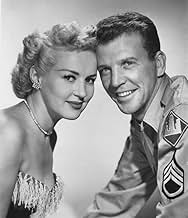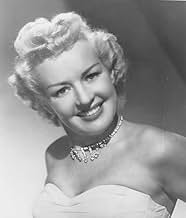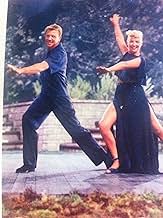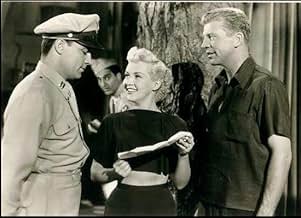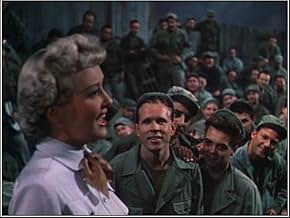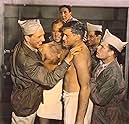VALUTAZIONE IMDb
5,7/10
302
LA TUA VALUTAZIONE
Aggiungi una trama nella tua linguaA G.I. in occupied Japan tries to re-woo his old love, who's putting on a show for the troops.A G.I. in occupied Japan tries to re-woo his old love, who's putting on a show for the troops.A G.I. in occupied Japan tries to re-woo his old love, who's putting on a show for the troops.
- Regia
- Sceneggiatura
- Star
- Premi
- 2 vittorie totali
The Three Dunhills
- Speciality Act
- (as The Dunhills)
Yumin Akita
- Japanese Man
- (non citato nei titoli originali)
Richard Allan
- Stewart
- (non citato nei titoli originali)
Leon Alton
- Soldier
- (non citato nei titoli originali)
Gordon Armitage
- Soldier
- (non citato nei titoli originali)
Robert Bohannon
- Soldier
- (non citato nei titoli originali)
Tommy Bond
- Little Soldier
- (non citato nei titoli originali)
Recensioni in evidenza
Screen-version of the Broadway musical revue from 1946 reconfigured as a Betty Grable vehicle by Fox, who saddled their star with a dull roster of leading men. She's a stage performer from the Great White Way who is currently performing in Tokyo with the Army-sponsored show "The Cats" and dodging ladies' man Dan Dailey, whom we first see trying to sell his tap shoes (!). She hears about volunteers needed for entertainment in Kyoto and beats it out of town with her gal-pal, only to run into military red tape when requesting 40 talented enlisted men to perform in her show and help move scenery. We never see Grable's Kay Hudson conceive her elaborate revue titled "Call Me Mister"--she seems to have it all worked out in her head--but the audition sequence with the soldiers is a lot of fun. Unfortunately, there's also Danny Thomas as a dishwashing private who's anxious to get in on the act and date Kay, but she gives him the brush-off when Dailey reappears (and if there was ever an also-ran, it's Danny Thomas). Dailey's Sgt. Dooley puts his dancing shoes back on for Kay's show thinking he's AWOL (he's really not, but don't ask why)--plus, it turns out he's really Kay's husband (ah, that's why he spends the night in her quarters!). And then there's dimply Dale Robertson as a captain who proposes marriage to Kay...and Richard Boone as a disgruntled mess sergeant...and Benay Venuta as Kay's girlfriend, who pushes Thomas out on stage unexpectedly to do a comedy routine that has the on-screen audience in stitches. None of it makes any sense, and screenwriters Albert E. Lewin and Burt Styler wouldn't know a funny line if they tripped over one, but the tap dancing sequences staged by Busby Berkeley are lively and the final number, "Love is Back in Business" composed by Sammy Fain and Mack Gordon, provides a colorful send-off. ** from ****
What a shame. They just never seemed to know what to do with Betty Grable. She gets these terrible films to star in, which she can't possibly save.
In this effort, we are at the very end of WW2 and it's the usual 'let's-put-on-a-show' type of musical storyline set against the backdrop of whether or not Betty Grable (Kay) will get back together romantically with fellow performer and soldier Dan Dailey (Shep). There are two other potential suitors on hand - captain Dale Robertson (Johnny) and pot-washer Danny Thomas (Stanley). We know that there is only ever going to be one winner so there is no drama with this storyline.
As for the cast, we get some terrible set pieces, especially the end performances. Also, how can we spend so much time with Thomas and his painful monologues? They are NOT FUNNY. Ever. How could the film's producers not catch on to this? The film scores points for Grable dancing, a couple of songs at the beginning, The Three Dunhills speciality dancing act and Technicolour.
There is nothing going on here whenever Grable is off screen. It's a tedious film that limps to an anti-climax of an ending.
In this effort, we are at the very end of WW2 and it's the usual 'let's-put-on-a-show' type of musical storyline set against the backdrop of whether or not Betty Grable (Kay) will get back together romantically with fellow performer and soldier Dan Dailey (Shep). There are two other potential suitors on hand - captain Dale Robertson (Johnny) and pot-washer Danny Thomas (Stanley). We know that there is only ever going to be one winner so there is no drama with this storyline.
As for the cast, we get some terrible set pieces, especially the end performances. Also, how can we spend so much time with Thomas and his painful monologues? They are NOT FUNNY. Ever. How could the film's producers not catch on to this? The film scores points for Grable dancing, a couple of songs at the beginning, The Three Dunhills speciality dancing act and Technicolour.
There is nothing going on here whenever Grable is off screen. It's a tedious film that limps to an anti-climax of an ending.
So goes the first line of the title song of the 1946 hit Broadway revue on which this is (very loosely) based. 20th obviously couldn't film a revue, and a lot had happened in five years, so it whipped up a story and added some new songs to the Harold Rome score, most of which it discarded. As an adaptation it's a bust, but as an original movie musical it's pretty good. And what really makes it work, of all things, is Dan Dailey. As Betty Grable's still-in-love-with-her ex, he's much more of an actor than most hoofers, and his.yearning and longing provide an emotional center.it surely wouldn't have otherwise. Grable does her usual thing, nicely, with lots of legs, and Danny Thomas is saddled with some shabby material and a not-good song as The Ethnic Humor. The most thrilling, and unexpected, moment is surely "Going Home Train," a celebration of returning GIs led by, of all people, Bobby Short. The plot, such as it is, wraps up quickly and illogically, and Lloyd Bacon's best directorial days were long gone. But as a run-of-the-mill Fox musical with more emotional engagement than most, thanks to Dailey, I like it fine.
There was not much you could do with Call Me Mister after 20th Century Fox bought the rights. Unless of course you wanted to do a review like Ziegfeld Follies. So the title is retained and a few songs and a story is written. Of course when you have Betty Grable doing her fourth and last film with Dan Dailey that usually sold any film that Fox put out.
Harold Rome wrote the score for the Broadway revue Call Me Mister. The theme was about the end of World War II and the return to civilian life for the troops. The songs and sketches reflected that. The very topicality of the show is the reason it's not revived today. The plot here concerns the end of the war. Betty Grable is a WAC and her estranged husband are both in occupied Japan. They were a double act in vaudeville, she's looking to put on a GI show. He's looking to get the title of civilian again.
But Dailey who arrives at base a little late finds his ship has sailed for the USA and discharge. So he fakes some orders and gets himself assigned to Grable's show. Where he has to deal with Captain Dale Robertson to win back his wife.
Let's say it helps that Dailey sings and dances in his quest. And through some typical army red tape his potential jackpot disappears.
Danny Thomas is in the cast also and he gets one of the Rome retained songs Military Life. Bobby Short also is lead singer with Going Home Train also retained from the original.
I can't understand myself why the biggest hit of the show South America Take It Away didn't make the film. It sold a lot of records for Bing Crosby and the Andrews Sisters. As the film itself was about putting on a show it could have been worked in easily enough. It's heard in passing briefly.
One song I always liked was The Shiny New Face On The Dime in tribute to Franklin D. Roosevelt. In 1946 with FDR's death still fresh it was a poignant show stopper. I guess that Darryl Zanuck felt it wouldn't have the same impact in 1951. A pity, it's a great song.
In small roles at the start of their careers are Richard Boone and Jeffrey Hunter both Fox contract players. Benay Venuta is Grable's girl sidekick and she and Thomas pair off well.
For fans of any of the cast members in this still amusing and entertaining musical.
Harold Rome wrote the score for the Broadway revue Call Me Mister. The theme was about the end of World War II and the return to civilian life for the troops. The songs and sketches reflected that. The very topicality of the show is the reason it's not revived today. The plot here concerns the end of the war. Betty Grable is a WAC and her estranged husband are both in occupied Japan. They were a double act in vaudeville, she's looking to put on a GI show. He's looking to get the title of civilian again.
But Dailey who arrives at base a little late finds his ship has sailed for the USA and discharge. So he fakes some orders and gets himself assigned to Grable's show. Where he has to deal with Captain Dale Robertson to win back his wife.
Let's say it helps that Dailey sings and dances in his quest. And through some typical army red tape his potential jackpot disappears.
Danny Thomas is in the cast also and he gets one of the Rome retained songs Military Life. Bobby Short also is lead singer with Going Home Train also retained from the original.
I can't understand myself why the biggest hit of the show South America Take It Away didn't make the film. It sold a lot of records for Bing Crosby and the Andrews Sisters. As the film itself was about putting on a show it could have been worked in easily enough. It's heard in passing briefly.
One song I always liked was The Shiny New Face On The Dime in tribute to Franklin D. Roosevelt. In 1946 with FDR's death still fresh it was a poignant show stopper. I guess that Darryl Zanuck felt it wouldn't have the same impact in 1951. A pity, it's a great song.
In small roles at the start of their careers are Richard Boone and Jeffrey Hunter both Fox contract players. Benay Venuta is Grable's girl sidekick and she and Thomas pair off well.
For fans of any of the cast members in this still amusing and entertaining musical.
LLoyd Bacon, the director of "Call me Mister", had an excellent track record as the man that gave us "42 Street", "Gold Diggers of 1936", "The Frisco Kid", and "Brother Orchid", among others. The film is based in a musical review with music by Harold Rome and Arnold Auerbach.
The plot is a vehicle to show Betty Grable in a musical about a USO performer in post war Japan. The story is just a pretext to present Ms. Grable as an entertainer who wants to share joy among the troops still awaiting repatriation. Ms. Grable had such an effervescence about herself, it's easy to fall under her spell even in such a silly comedy as this one.
Dan Dailey plays the man in Ms. Grable's life. He was an excellent singer and dancer who always projected a masculine presence in anything he did. Both Ms. Grable and Mr. Dailey make a winning combination in the movie.
We get to see other faces that went to make names for themselves. Dale Robertson, Danny Thomas, Richard Boone, Jeffrey Hunter, Frank Fontaine, Jerry Paris and Bobby Short, among others.
The musical numbers were staged by Busby Berkley, a man who always had an edge in everything he did. The last production number stands out as the four principals, Ms. Grable, Mr. Dailey, Ms. Venata and Mr. Thomas take to the stage.
That was entertainment!
The plot is a vehicle to show Betty Grable in a musical about a USO performer in post war Japan. The story is just a pretext to present Ms. Grable as an entertainer who wants to share joy among the troops still awaiting repatriation. Ms. Grable had such an effervescence about herself, it's easy to fall under her spell even in such a silly comedy as this one.
Dan Dailey plays the man in Ms. Grable's life. He was an excellent singer and dancer who always projected a masculine presence in anything he did. Both Ms. Grable and Mr. Dailey make a winning combination in the movie.
We get to see other faces that went to make names for themselves. Dale Robertson, Danny Thomas, Richard Boone, Jeffrey Hunter, Frank Fontaine, Jerry Paris and Bobby Short, among others.
The musical numbers were staged by Busby Berkley, a man who always had an edge in everything he did. The last production number stands out as the four principals, Ms. Grable, Mr. Dailey, Ms. Venata and Mr. Thomas take to the stage.
That was entertainment!
Lo sapevi?
- QuizIn this musical, director Lloyd Bacon and dance director Busby Berkeley worked together for the first time since Quarantaduesima strada (1933).
- BlooperShep Dooley hops a ride on a rickshaw to reach his military base and passes a stonewall flower garden. Several hours and a very tired rickshaw runner later, he reaches his destination, and we pass the very same flower garden.
- Citazioni
Kay Hudson: Well, captain, I'll be brief.
Capt.Johnny Comstock: Oh, please don't.
I più visti
Accedi per valutare e creare un elenco di titoli salvati per ottenere consigli personalizzati
Dettagli
- Data di uscita
- Paese di origine
- Lingua
- Celebre anche come
- Call Me Mister
- Luoghi delle riprese
- Azienda produttrice
- Vedi altri crediti dell’azienda su IMDbPro
Botteghino
- Budget
- 1.900.000 USD (previsto)
- Tempo di esecuzione1 ora 36 minuti
- Proporzioni
- 1.37 : 1
Contribuisci a questa pagina
Suggerisci una modifica o aggiungi i contenuti mancanti

Divario superiore
By what name was Butterfly americana (1951) officially released in Canada in English?
Rispondi

